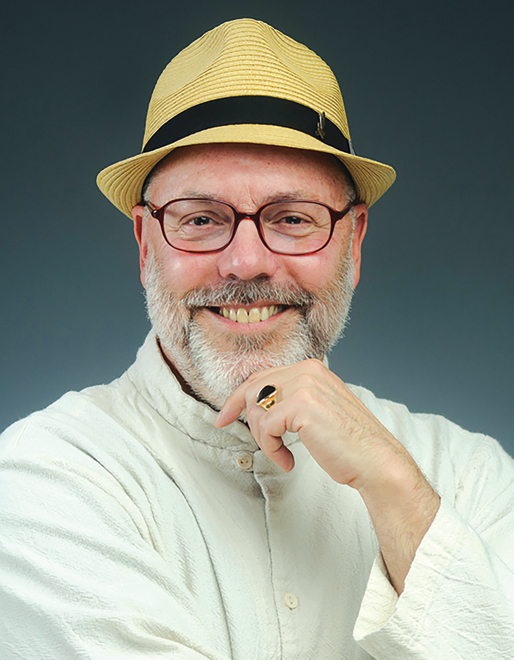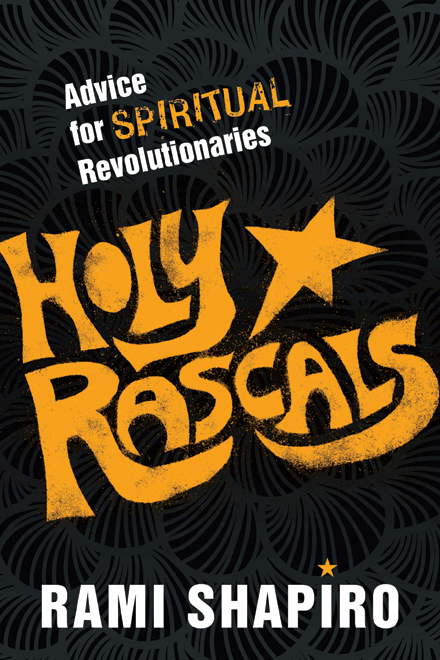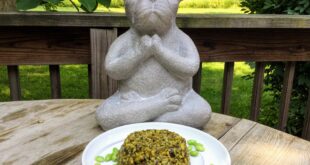
by Janae Jean & Spencer Schluter –
For our featured interview this month, we spoke with Rabbi Rami Shapiro. Rabbi Rami is the author of over 30 books, including his most recent, Holy Rascals. He is also the host of the podcasts Essential Conversations with Rabbi Rami and the How To Be A Holy Rascal as well as an advice columnist for Spirituality & Health. Rabbi Rami served as a chaplain for the United States Air Force for three years, lead Temple Beth Or in Miami, Florida for 20 years, and taught religion at Middle Tennessee State University for ten years. Currently, he guides the One River Foundation, www.oneriverfoundation.org, which is dedicated to promoting “Perennial Wisdom at the mystic heart of humanity’s religions.”
Connect with Rabbi Rami via Facebook, Twitter and Instagram, as well as his website, www.rabbirami.com.
The following article only contains a small portion of our conversation with Rabbi Rami, listen to the podcast to hear our in-depth interview with the player at the bottom of the page. Subscribe to the Conscious Community Podcast on iTunes, GooglePlay, Stitcher, and/or YouTube for the latest updates, mid-month episodes and more. –J.J.
 The following article only contains a small portion of our conversation with Rabbi Rami, listen to the podcast to hear our in-depth interview. Subscribe to the Conscious Community Podcast on iTunes, GooglePlay, Stitcher, and/or YouTube for the latest updates, mid-month episodes and more. — J.J.
The following article only contains a small portion of our conversation with Rabbi Rami, listen to the podcast to hear our in-depth interview. Subscribe to the Conscious Community Podcast on iTunes, GooglePlay, Stitcher, and/or YouTube for the latest updates, mid-month episodes and more. — J.J.
Spencer: I felt a lot of commonality with you, reading your book. “Holy Rascals” find the Perennial Wisdom in all religions and use humor to transcend and find that universal truth… You have somebody like George Carlin or Bill Hicks, who is dropping this really heavy truth on the audience, but at the end of the day people can just laugh it off and say, “That’s just entertainment.” Do you think that is a problem for “Holy Rascals?”
Rabbi Rami: Well… I think both. It’s a problem and a gift. The problem is something like you said where people say, “That’s just entertainment.” I think a bigger problem is when people think that laughing in and of itself is enough… I think you can convince yourself that merely making or merely having fun is sufficient. That isn’t what Holy Rascals is trying to do. Holy Rascals is using humor to strip away the B.S. that so many religions
hide behind…
 My Zen master, Joshu Sasaki Roshi, told me back in the ‘70s…“Zazen is fine. Zen meditation is fine, but you don’t really need it. All you really need to do is sit on the edge of your bed in the morning when you wake up and start to laugh. At first, it will be forced laughter, but after a while the laughter becomes real. When the laughter becomes real and you let it take over and you end up with tears rolling down your cheeks, then you can get up and go about your day. You’ll be living your day in a state of… liberation.” At the heart of so much “brand-name” religion is fear, but when you’re laughing, fear can’t take hold. So, laughter is the great liberator.
My Zen master, Joshu Sasaki Roshi, told me back in the ‘70s…“Zazen is fine. Zen meditation is fine, but you don’t really need it. All you really need to do is sit on the edge of your bed in the morning when you wake up and start to laugh. At first, it will be forced laughter, but after a while the laughter becomes real. When the laughter becomes real and you let it take over and you end up with tears rolling down your cheeks, then you can get up and go about your day. You’ll be living your day in a state of… liberation.” At the heart of so much “brand-name” religion is fear, but when you’re laughing, fear can’t take hold. So, laughter is the great liberator.
Janae: What about the movement for people to embrace various traditions from around the world? They’re leaning towards the Perennial Wisdom, but some people seem to look at it as a way to acquire new dogma, new rituals. What do you say to point those people towards the truth behind the rituals?
RR: Yeah, that’s always the challenge, the struggle between literalism and metaphor… We tend to take these things very shallowly, which is another way of saying very literally. So, when people of different religious backgrounds come together and tap the Perennial Wisdom in their own traditions, and share that among one another, I think that’s fabulous.
When you are doing your meditative work, your contemplative work, you seem to come to the Perennial Wisdom. So, we have to take a look at these things the way the Zen people talk about them as “fingers pointing towards the moon and not the moon itself.” In the world of the Holy Rascal, we are willing to follow the finger of anyone who’s pointing to that Perennial truth. In the world of “brand-name” religions, people usually take their fingers and give each other their fingers, as it were.
SS: You say your mother tongue is Judaism. Is that because of how you were raised? Have you made a conscious decision to remain being a rabbi and to remain being Jewish, even though you have learned all this wisdom from these other traditions?
RR: I was raised in an Orthodox Jewish environment, but when I was 16 I discovered Buddhism through a class in high school… I became what I would call then a serious Buddhist practitioner. I had a Zen teacher and ultimately worked with several Zen masters. I took it very seriously as a practice, not simply as book learning…. I find wisdom in all these places. When I’m talking about these things I’m blending the languages of Hinduism, Buddhism, Judaism, Taoism, Christianity and Islam.
I have gone to India many times to teach. Often when I’m there, and I’m talking about Judaism, Swamis will come up to me and say that sounds like Vedanta Hinduism. Are you sure you’re telling us [about] Judaism?” What the confusion is…and this is how I reconcile this for myself…is the Judaism I teach is the Perennial Wisdom that comes through Judaism. I’m using Jewish language, Jewish tradition, symbol and ritual, to expound the Perennial. That’s why if you’re a Hindu who’s also rooted in the Perennial, you will hear a lot of resonance with that.
JJ: You write a column; you write books; you host podcasts. What do you think is the most effective mode of communication for the future?
RR: I’ve written over three dozen books. I think that long-form books just aren’t speaking to people the way they used to…I think that short-form writing is still very powerful, parables, aphorisms, that kind of thing. I think that podcasts are very, very powerful because they’re so immediate… Stuff like what you’re doing, or my podcast, Essential Conversations With Rabbi Rami, or so many other people’s podcasts. [Podcasts] dive into the moment and bring out all kinds of wisdom that is incredibly timely, even if it is also incredibly transient. I think that podcasts definitely have a bright future.
Janae Jean serves as editor, social media manager and podcaster for Conscious Community Magazine. She has an M.M. in computer music composition from Johns Hopkins University and is actively researching using electronically generated sounds for healing. See janaejean.com and perennialmusicandarts.com for details about Janae’s upcoming classes, lesson information, workshops, shows and projects.
Spencer Schluter is the advertising account manager, social media manager and podcaster for Conscious Community Magazine. His experience includes visual communications, advertising, social media, marketing, public relations and business development. Visit yggstudios.com for more information about his freelance design and consulting work. He is also a master level Reiki and traditional Chinese Qigong practitioner.
Podcast Theme Music: Sublimation (Theme from the Conscious Community Podcast)
Janae Jean Almen and Spencer Schluter, composers SpindriftGreenMusic Publishing ©2017
Podcast: Play in new window | Download
Subscribe: RSS
 Conscious Community Magazine Dedicated to Elevating Consciousness
Conscious Community Magazine Dedicated to Elevating Consciousness




